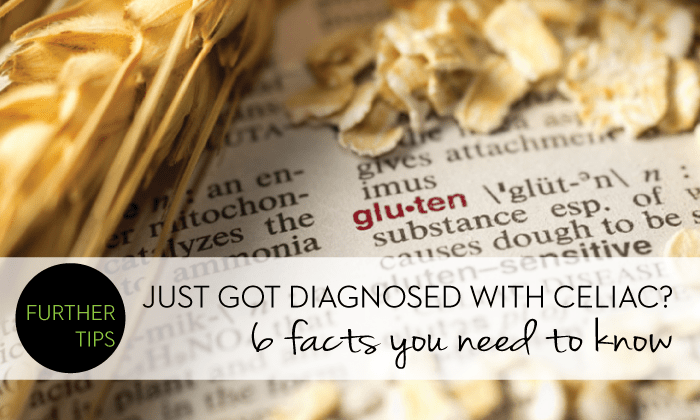Just Got Diagnosed with Celiac? 6 Facts You Need to Know

Unlike many other diseases, there is no medication to treat celiac disease. Instead, the total avoidance of gluten is the only way to stop the immune system from attacking itself. If you or someone you know has recently been diagnosed with celiac disease here are some important tips to take note of:
1. Avoid gluten in all forms. Gluten is found in wheat, barley and rye. Some oats may be contaminated with gluten, so it is important to only buy oats that are labeled gluten-free. To be safe, if you are not sure as to whether or not a product has gluten, it is best not to purchase it. Instead, try calling the company to obtain correct information.
2. Avoid cross contamination at all costs. It may sound silly, but using designated gluten-free kitchen utensils, toasters, pots and pans is very important. Most people with celiac can tolerate up to 1/8 teaspoon (10 milligrams) of wheat flour per day without experiencing symptoms, but remember, just because you are not feeling symptoms does not mean you're not doing damage. If intestinal damage occurs due to frequent ingestion of gluten, the risk of developing lymphoma greatly increases.
3. The gluten-free diet is not a weight loss diet. There are many gluten-free faddists that follow this diet to lose weight. If a gluten-free diet is not closely monitored, nutrient deficiencies can occur. The law requires that wheat flours are fortified, whereas fortification of gluten-free flours is not. Coupled with poor nutrient absorption when the intestines are inflamed, those following a gluten-free diet are often susceptible to lower intakes of iron, folic acid, niacin and zinc. This is why it is important to eat a varied diet that consists of fruits, vegetables, protein and a variety of gluten-free grains. Supplementation with a B-complex vitamin and/or multivitamin may also be needed. Remember, even your vitamins need to be gluten-free!
4. Actually, you can have your gluten-free cake and eat it too! Just because you’re gluten-free doesn’t mean that you can’t enjoy dessert. There are loads of gluten-free flour alternatives that you can use in baked goods, such as pre-made gluten-free flour blends, oat flour (be sure to get gluten-free varieties as there can be cross contamination in oat fields), and almond meal which provides for a nice texture in cookies. Check out my coconut lemon cake, and some other celiac approved desserts here.
5. Be careful when eating out. If the food is not made in a gluten-free kitchen, chances are there will be cross contamination. Even walking into a restaurant with flour in the air, such as a pizzeria, can trigger an immune response. If you plan to eat out, review the menu beforehand and have a conversation with the chef or restaurant manager so they know exactly how your food needs to be handled.
6. Embrace the foods you can eat. Following a gluten-free diet has its challenges, but gluten-free foods are more accessible now than they have ever been. It is likely that your local grocery store has an entire aisle designated to gluten-free products. Meet with a Registered Dietitian to obtain a list of naturally gluten-free foods and a sample menu plan. Lastly, joining a support group is a great way to find out about products and obtain gluten-free recipes. Here are some great gluten-free recipes from Further Food to get you started!
Note: PLEASE consult with your doctor before making any changes to your diet or medications. The material on this site is provided for educational purposes only, and is not to be used for medical advice, diagnosis or treatment.
























